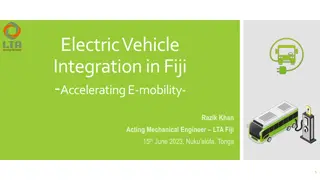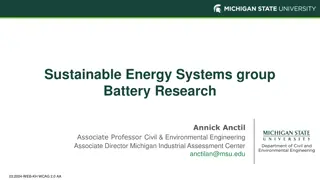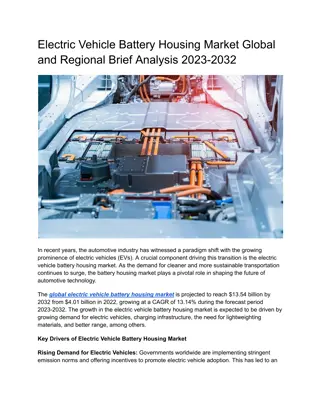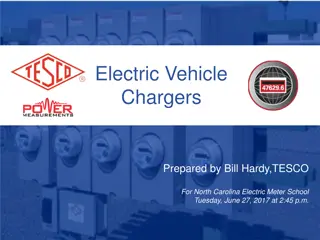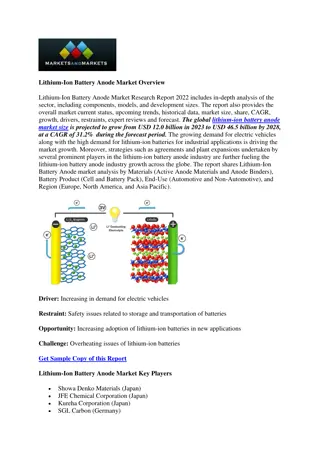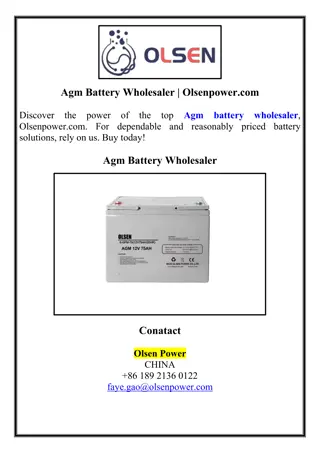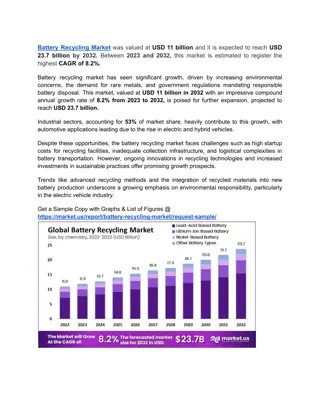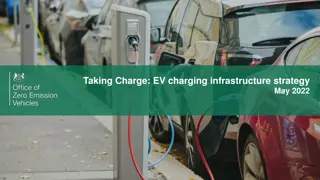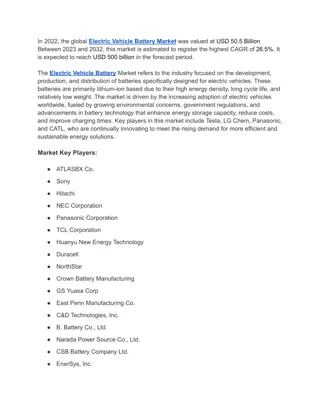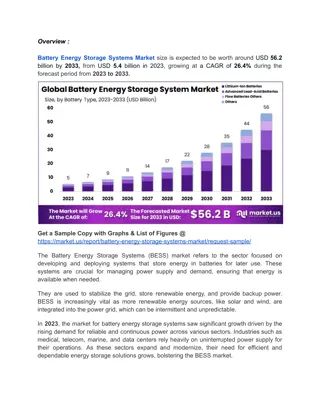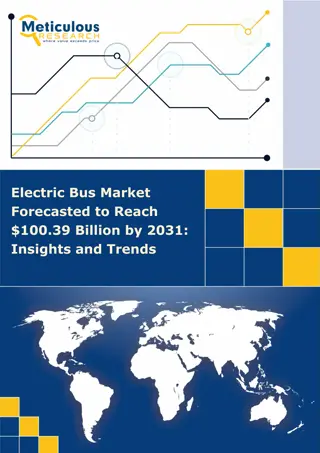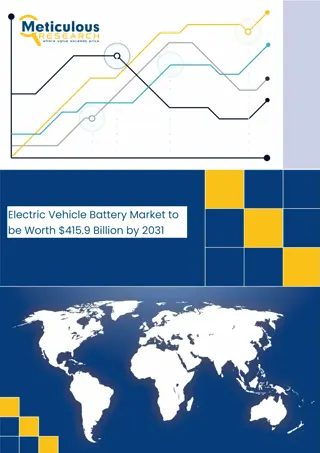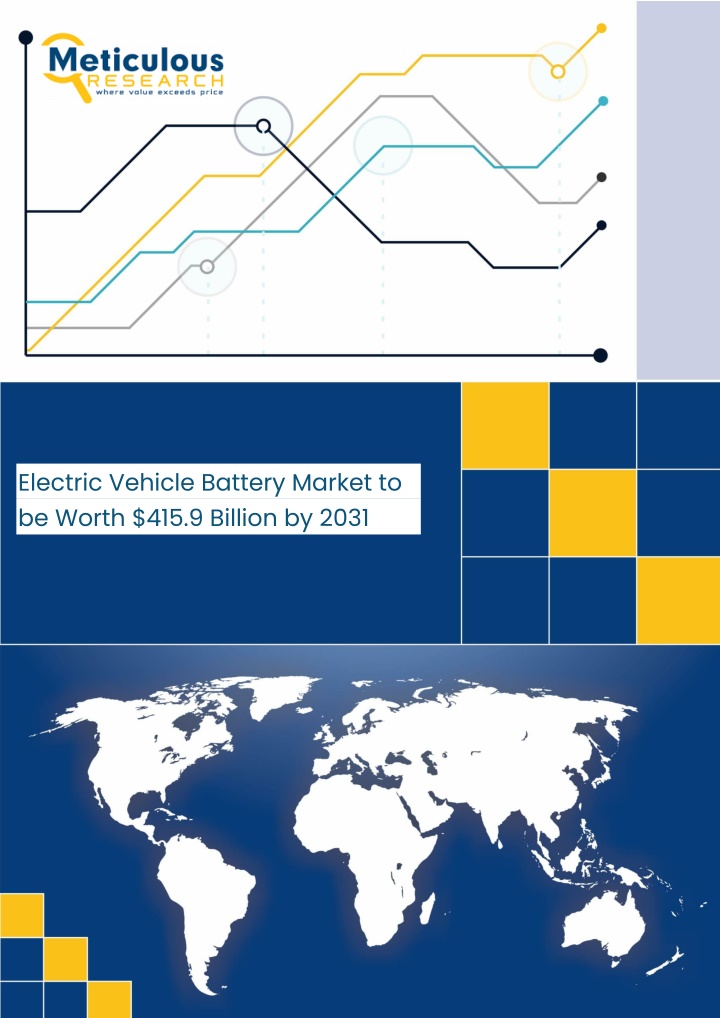
Electric Vehicle Battery
Explore $415.9 billion Electric Vehicle Battery Get exclusive insights on key trends, segments, geographical analysis, & competitive analysis!
Download Presentation

Please find below an Image/Link to download the presentation.
The content on the website is provided AS IS for your information and personal use only. It may not be sold, licensed, or shared on other websites without obtaining consent from the author. If you encounter any issues during the download, it is possible that the publisher has removed the file from their server.
You are allowed to download the files provided on this website for personal or commercial use, subject to the condition that they are used lawfully. All files are the property of their respective owners.
The content on the website is provided AS IS for your information and personal use only. It may not be sold, licensed, or shared on other websites without obtaining consent from the author.
E N D
Presentation Transcript
Electric Vehicle Battery Market to be Worth $415.9 Billion by 2031
Global Electric Vehicle Battery Market - 2024 to 2031 Electric Vehicle Battery Market Expected to Reach $415.9 Billion by 2031 A new report from Meticulous Research , Electric Vehicle Battery Market - Global Opportunity Analysis and Industry Forecast (2024-2031) , predicts that the global electric vehicle (EV) battery market will reach $415.9 billion by 2031, growing at a compound annual growth rate (CAGR) of 33.1%. The report highlights the increasing demand for electric vehicles and ongoing advancements in battery technologies as the primary drivers of market growth. Download Sample Report Here @ https://www.meticulousresearch.com/download- sample-report/cp_id=5210 Page 1 of 4 Meticulous Research| sales@meticulousresearch.com
Global Electric Vehicle Battery Market - 2024 to 2031 OEM Investments and Falling Battery Costs Drive Market Expansion The EV battery market is benefiting from the significant investments made by leading automotive original equipment manufacturers (OEMs) in electric mobility. As battery production scales up and costs decline, electric vehicles are becoming more affordable for consumers, leading to increased demand. Furthermore, government policies that promote electric mobility and aim to reduce greenhouse gas emissions are also driving market growth. Lithium Supply Shortages and Energy Density Challenges Despite the market s rapid growth, challenges persist. Lithium supply shortages could disrupt the EV battery supply chain, as lithium is a key material in battery manufacturing. Additionally, energy density limitations in current battery technologies affect the range of electric vehicles, which is a key concern for consumers. Addressing these challenges is crucial for sustained market growth. Opportunities in Emerging Markets and BaaS Business Models The electric vehicle battery market is seeing increasing opportunities in emerging markets, where the adoption of electric vehicles is accelerating. Battery-as-a-service (BaaS) business models are also gaining popularity, allowing consumers to lease batteries instead of purchasing them outright. This approach lowers the initial cost of electric vehicles and provides consumers with the flexibility to upgrade to newer battery technologies as they become available. Lithium-Ion Batteries to Maintain Dominance Lithium-ion batteries are expected to dominate the EV battery market, accounting for over 64.0% of the market share by 2024. The widespread adoption of lithium-ion batteries in electric vehicles, coupled with continuous advancements in battery performance and cost reductions, will ensure their continued leadership in the market. 51kWh to 100kWh Battery Capacity Segment to Lead The 51kWh to 100kWh battery capacity segment is projected to lead the market, capturing over 52.0% of the market share by 2024. These batteries provide an optimal balance between driving range and affordability, making them the preferred choice for electric passenger vehicles. As automakers develop more long-range EV models, demand for batteries in this capacity range is expected to rise. Wire Bonding Technology to Dominate Bonding Type Segment Wire bonding technology is expected to lead the bonding type segment, accounting for over 84.5% of the market by 2024. Wire bonding is widely used in battery manufacturing due to its cost-effectiveness and precision, making it essential for scaling up EV battery production. The increasing demand for electric vehicles will drive further growth in this segment. Prismatic Batteries to Lead the Battery Form Segment Prismatic batteries are projected to hold the largest share of the battery form segment, capturing over 45.0% of the market by 2024. Prismatic batteries are preferred for their compact design and energy efficiency, making them suitable for a wide range of electric vehicle applications. As prismatic battery technologies continue to improve, their market share is expected to grow. Page 2 of 4 Meticulous Research| sales@meticulousresearch.com
Global Electric Vehicle Battery Market - 2024 to 2031 Electric Cars to Lead the Application Segment Electric cars are anticipated to dominate the application segment, accounting for 46.5% of the market share by 2024. The rising demand for electric cars is driven by government incentives, increasing environmental awareness, and the expansion of charging infrastructure. As more consumers switch to electric vehicles, demand for batteries in this segment will continue to grow. OEMs to Lead the End-User Segment OEMs are projected to hold the largest share of the end-user segment, accounting for 85.0% of the market by 2024. Leading automotive manufacturers are investing heavily in expanding their EV battery production capacities to meet the growing demand for electric vehicles. The introduction of new electric vehicle models and government support for EV manufacturing will also drive growth in this segment. Asia-Pacific to Remain the Largest Market The Asia-Pacific region is expected to maintain its dominance in the global EV battery market, holding over 68.0% of the market share by 2024. The region s dominance is attributed to the presence of major battery manufacturers in countries such as China, Japan, and South Korea. Supportive government policies and strategic partnerships between automakers and battery manufacturers will further strengthen the region s leadership position. Conclusion: The Future Looks Bright for the EV Battery Market In conclusion, the global electric vehicle battery market is on a strong growth trajectory, driven by advancements in battery technology, increasing OEM investments, and government support for electric mobility. Although challenges such as lithium supply shortages and energy density limitations remain, the market s future is promising, offering significant growth opportunities for industry stakeholders. Browse in Depth : https://www.meticulousresearch.com/product/electric-vehicle- battery-market-5210 Key Players The report offers a competitive analysis based on an extensive assessment of the leading players product portfolios, geographic presence, and key growth strategies adopted in the last three to four years. Some of the key players operating in the EV battery market are SK Innovations Co. Ltd. ( South Korea), LG Chem, Ltd (South Korea), Farasis Energy (GanZhou) Co., Ltd. (China), SVOLT Energy Technology Co., Ltd. (China), BYD Company Limited (China), Samsung SDI Co., Ltd. (South Korea), GS Yuasa International Ltd. (Japan), Vehicle Energy Japan Inc. (Japan), Northvolt AB (Sweden), Panasonic Corporation (Japan), Contemporary Amperex Technology Co. Limited (CATL) (China), A123 Systems, LLC (China), Exide Industries Ltd. (India), Primearth EV Energy Co., Ltd. (Japan), E-One Moli Energy Corp. (Taiwan), StoreDot Ltd. (Israel), NOHMs Technologies, Inc. (U.S.), Lithium Werks B.V. (Netherlands), Faradion Limited (U.K.), and QuantumScape Corporation (U.S.). According to European Commission, the global manufacturing capacity of lithium-ion cells for electric cars and energy storage is around 150 GWh, and Europe hosts around 3% of global production capacity, and it is estimated that the share range is from 7% to 25%. The European Commission and European industrial companies developed The European Battery Alliance, a central platform for dialogue on the future of battery cell production in Europe. This platform Page 3 of 4 Meticulous Research| sales@meticulousresearch.com
Global Electric Vehicle Battery Market - 2024 to 2031 seeks to encourage the production of battery cells in both Germany and Europe and ensure that the batteries produced are competitive, innovative, and environmentally compatible. Also, the European government is taking initiatives to promote the adoption of EVs in the market. This will boost the demand for EV batteries in the region. The European Commission is seeking funding from the Spanish government's Programme for the Promotion of Industrial Competitiveness and Sustainability projects, which aims to extract 15,000 tons of raw material per year. Such initiatives for the development of battery technologies are expected to boost the demand for EV batteries in Europe in the forecast period. Key Questions Answered in the Report: Which are the high-growth market segments in terms of type, battery capacity, bonding type, battery form, application and end user? What was the historical market size for EV batteries globally? What are the market forecasts and estimates for 2024 2031? What are the major drivers, restraints, opportunities, challenges, and trends in the electric vehicle battery market? Who are the leading companies in the electric vehicle battery market, and what are their respective market shares? What is the competitive landscape like? What are the recent developments in the EV battery market? What do major market players adopt the various growth strategies? What are the major market trends, and which are the high-growth countries? Who are the local emerging players in the EV battery market, and how do they compete with other players? Purchase Now : https://www.meticulousresearch.com/Checkout/63481183 Contact Us: Meticulous Research Email- sales@meticulousresearch.com Contact Sales- +1-646-781-8004 Connect with us on LinkedIn- https://www.linkedin.com/company/meticulous-research Page 4 of 4 Meticulous Research| sales@meticulousresearch.com




